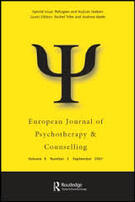Overview of Training with SAFPAC
TRAINING FOCUS
Successful participants may apply to go on the UKCP register as an existential-analytic psychotherapeutic counsellor during phase 4, and as an existential-analytic psychotherapist after phase 4.
In SAFPAC, psychotherapeutic counselling focuses on time-limited (up to 1 year) therapy, whereas existential-analytic psychotherapy also focuses on long-term open-ended therapy.
THE ETHOS OF THE TRAINING WITH SAFPAC
An attempt is made to offer a place where we might still be able to think about how alienated we are through valuing existential notions such as experience and meaning whilst questioning other aspects such as existentialism’s inferred narcissism and the place it has come to take up with regards to such aspects as psychoanalysis and the political. The post-existential would also include the post-phenomenological, where, for example, Merleau-Ponty’s notion of being open to what emerges in the between (as well as his notion of embodiment) would be given primacy.
The ethos of the training is to start with practice, existential-analytic (and other) theories being seen as having implications rather than applications. Also both psychotherapy and research are seen as cultural practices. With regard to theory post-existential (Loewenthal 2008) is taken to mean “after” Heidegger and “in a different way” – after Husserl’s phenomenology, yet looking to retain what might be both good from existentialism together with aspects of psychoanalysis, the political and developments such as postmodernism. Post-existentialism will be explored in relation to individual and group psychological therapies, clinical supervision, ethical practice and research. Each term will focus on the inter-relationships between existentialism, psychoanalysis and postmodernism respectively.
WHY TRAIN WITH SAFPAC?
The quality of this training is linked with research and developments in the field, and through membership of the Constructivist and Existential College (CEC) of UKCP, aims to meet the highest of academic as well as professional and ethical standards.
Be part of a community developing critical existential-analytic psychotherapy.
Other benefits of the training include:
- Phase one (year one) is an introduction to critical psychotherapy and phenomenology initially through Rogers.
- Phase two (year two) explores phenomenology in existentialism, psychoanalysis and critical psychotherapy.
- Phase three (year three) addresses some implications of theory and research for thoughtful practice.
- Phase four (year four/continuity year) focuses on developing practice; the single session, brief and long term therapy.
Successful participants may apply to go on the UKCP register as an existential-analytic psychotherapeutic counsellor during phase 4, and as an existential-analytic psychotherapist after phase 4.
In SAFPAC, psychotherapeutic counselling focuses on time-limited (up to 1 year) therapy, whereas existential-analytic psychotherapy also focuses on long-term open-ended therapy.
THE ETHOS OF THE TRAINING WITH SAFPAC
An attempt is made to offer a place where we might still be able to think about how alienated we are through valuing existential notions such as experience and meaning whilst questioning other aspects such as existentialism’s inferred narcissism and the place it has come to take up with regards to such aspects as psychoanalysis and the political. The post-existential would also include the post-phenomenological, where, for example, Merleau-Ponty’s notion of being open to what emerges in the between (as well as his notion of embodiment) would be given primacy.
The ethos of the training is to start with practice, existential-analytic (and other) theories being seen as having implications rather than applications. Also both psychotherapy and research are seen as cultural practices. With regard to theory post-existential (Loewenthal 2008) is taken to mean “after” Heidegger and “in a different way” – after Husserl’s phenomenology, yet looking to retain what might be both good from existentialism together with aspects of psychoanalysis, the political and developments such as postmodernism. Post-existentialism will be explored in relation to individual and group psychological therapies, clinical supervision, ethical practice and research. Each term will focus on the inter-relationships between existentialism, psychoanalysis and postmodernism respectively.
WHY TRAIN WITH SAFPAC?
The quality of this training is linked with research and developments in the field, and through membership of the Constructivist and Existential College (CEC) of UKCP, aims to meet the highest of academic as well as professional and ethical standards.
Be part of a community developing critical existential-analytic psychotherapy.
Other benefits of the training include:
- Staff have experience in providing training within the university sector and as such have been involved in ensuring training as a psychotherapist has rigorous quality mechanisms in place.
- Staff forming the training committee are all practitioners with many years experience as psychotherapists, teachers and researchers.
- The supervisory staff have also engaged in their own practice and research.
- Accreditation as an existential-analytic psychotherapist and existential-analytic psychotherapeutic counsellor enabling registration on the United Kingdom Council for Psychotherapy (UKCP) register.
- Reduced fees for associated conferences and events.
- The programme is designed to assist in meeting the BACP requirements for individual accreditation.
- Opportunities to join networks and special interest groups, through for example, the Critical Psychotherapy Network.
- Reduced fee subscription to the European Journal of Psychotherapy and Counselling.
- Access to events and other news through the website.
About the trainingClick here to find out more about the training, including entry requirements, fees and how to apply.
Training committeeAt least one member of the following training committee is part of each trainees’ supervisory team, which is reviewed with the trainee on an annual basis. The other members of the supervisory team can also be drawn from SAFPAC members who have been registered as psychotherapists for a minimum of three years and are on the UKCP registers as existential-analytic psychotherapists.
Professor Del Loewenthal Dr Julia Cayne Dr Onel Brooks |
Term datesACADEMIC YEAR 2023-2024
ACADEMIC YEAR 2024-2025
Venue: Normally Wimbledon Park Hall (Arthur’s Cafe) 170 Arthur’s Road , London SW19 7AQ (near Wimbledon Park Underground Station) Supervision and therapy by arrangement. |




